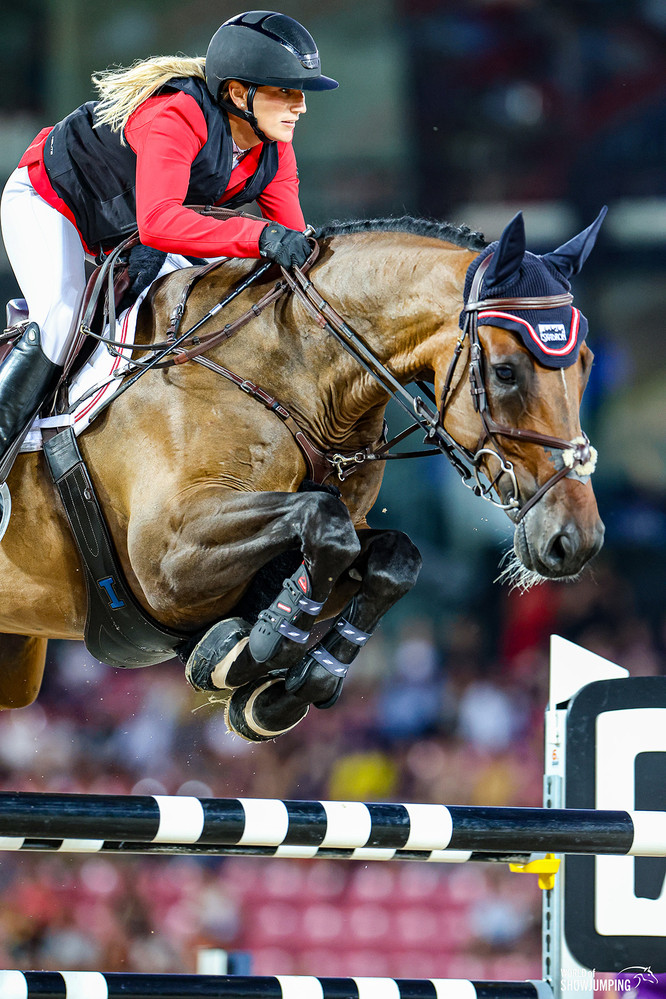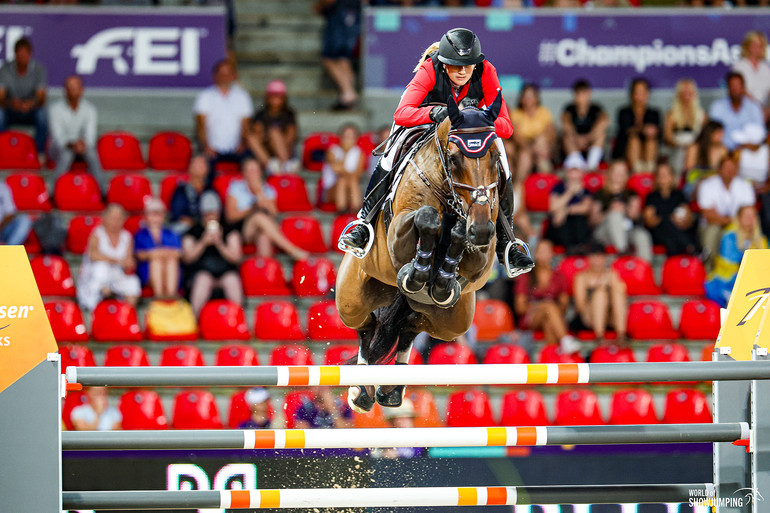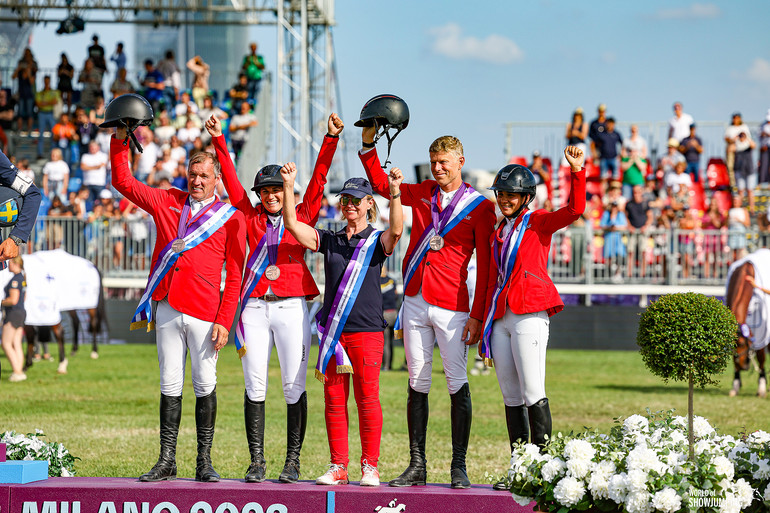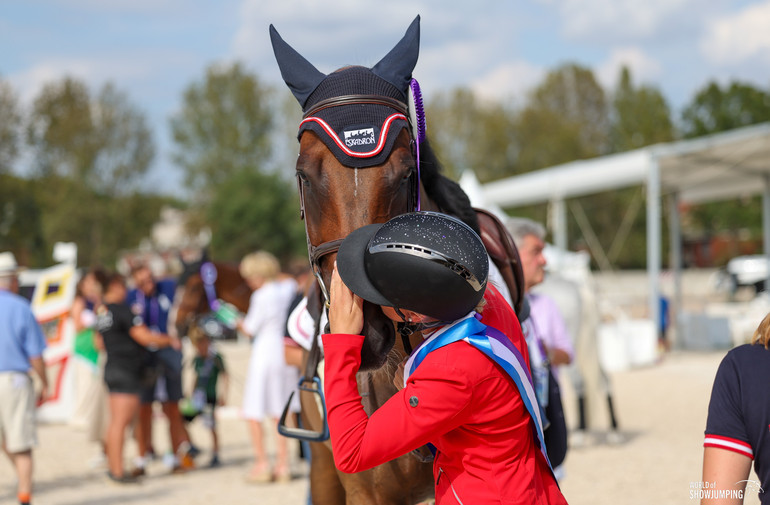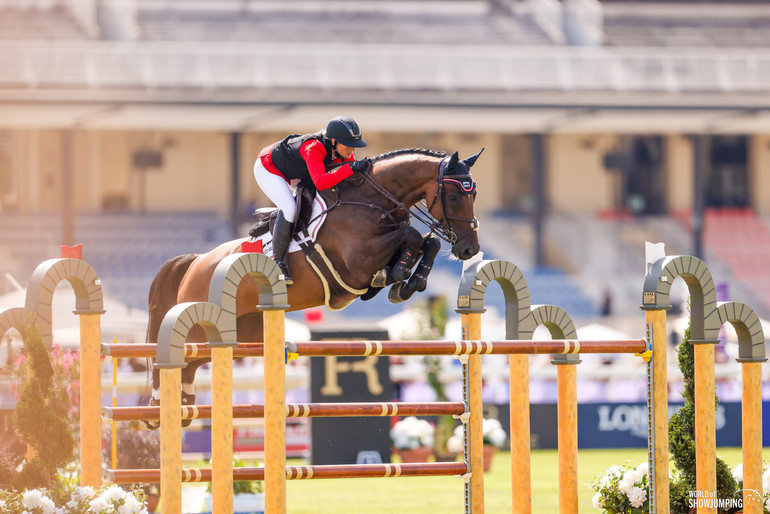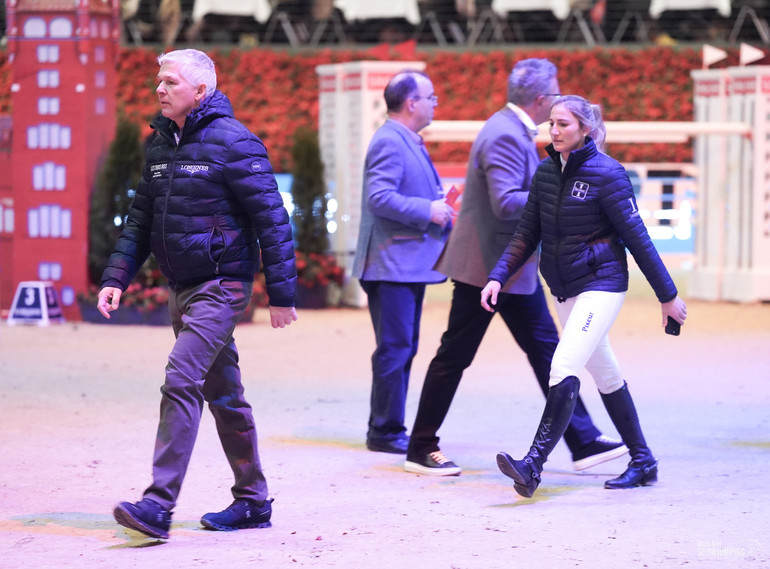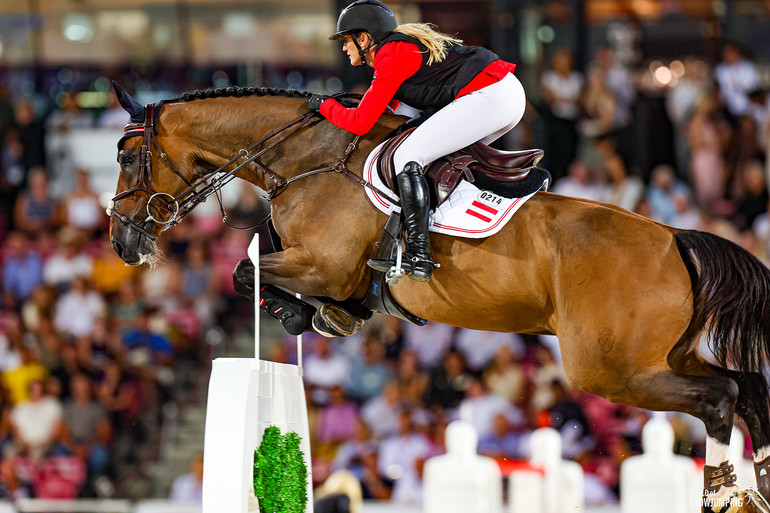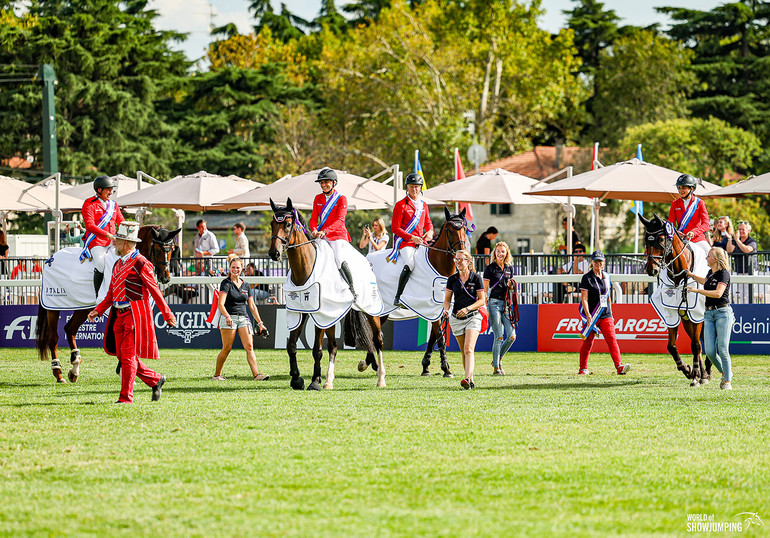Text © World of Showjumping
“I believe you see your horses differently when you spend a lot of time with them,” Austria’s Katharina Rhomberg – who was born into an equestrian family, where both her parents as well as her grandparents rode – tells WoSJ. “I grew up with horses and started riding with my father, who was my first teacher. My childhood was basically spent in the stable; we did everything ourselves – from getting up early in the mornings to do the stable to going to the shows without grooms.”
It is very important to learn horsemanship right from the start
“I think that gave me a strong base; in my opinion it is very important to learn horsemanship right from the start. I know my horses; I can see if they are getting sick, or if there is something wrong. I think that as a rider, you should know what your horses need; you have to understand how to feed them correctly, and also know what the blacksmith as well as the vet are doing.”
Going slow
“I think nowadays, many rush the first steps,” Katharina continues. “I believe you should not go to the shows so quickly and definitely not at international level. When I was a child, we had normal, safe horses – and for our classes, they were perfect. It might have taken us a bit longer time to get into the big shows, but actually, I think going slow has been an advantage. When you have a solid foundation, everything will fall into place in the long run. If something doesn't work, you have to be fair to your horse and maybe step down a level to build trust between the two of you. We shouldn't be in a hurry when it comes to horses.”
I think nowadays, many rush the first steps
Even though being a professional rider was always her dream, Katharina preferred to have a back-up plan and studied economics before focusing full time on riding. Today, the 32-year-old is based in Dornbirn in Austria – close to the border of Switzerland and Germany – and her string of 14 horses is a combination of younger and older, more experienced horses. “When I first decided to be a professional, I was very lucky to find a good owner who was willing to invest in younger horses and together we have built them up the levels. That has been the base of our system. I'm really happy that he can keep the horses for me, and that he has the same vision; he enjoys seeing the horses progress and compete at the bigger shows. What I enjoy the most in our sport is the partnership and connection you create with the horse. And horses teach us a lot, daily. At the moment I couldn't imagine doing anything else.”
From Milan to Paris
Last summer, Katharina was part of the Austrian team that took a historical bronze medal at the FEI Jumping European Championships in Milan, and, simultaneously, qualified Austria for the 2024 Paris Olympic Games. “We definitely didn't expect to get a medal,” Katharina tells about the emotional week in Italy. “We were well aware of how hard it would be to end up on the podium with so many good teams competing. Our main goal in Milan was to qualify for the Olympics, and when we reached this, we were so happy – in the end, the medal was like the icing on the cake. It was a really big surprise and I think it meant a lot for Austria as a country.”
I think we are starting to see where having a long-term plan can lead, and the Olympics have been a big goal
“In earlier times, Austria has enjoyed huge success in showjumping with riders like Hugo Simon and Thomas Frühmann, but lately – for quite a long period – it has been pretty quiet, with Max Kühner being responsible for most of the good results,” Katharina continues. “There has been a big gap between the top and the rest, even though we do have good riders in Austria. Now it feels like we are finding our way back to a position where everyone has horses for the higher level and we can put together a strong team. We have always had good riders, but they have all worked in a system where they have preferred to take time to build up their horses. In addition, we now have owners who have kept these horses – which is very important. I think we are starting to see where having a long-term plan can lead, and the Olympics have been a big goal. Now that we are qualified, it will hopefully motivate even more people to invest in the future and think long-term in their planning.”
“For the future, I think it is important that we never lose sight of the fact that horses are our partners,” Katharina points out. “I think horse welfare is a very important topic and it is something we as riders have to focus on. We love our horses and know that they have to be happy to do the sport. We probably do more for our horses than we do for ourselves, and we really have to show this to the general public. I want to keep our sport in the Olympics and I want to be able to ride in 20 years.”
Cuma 5
In Milan, Katharina rode the now 12-year-old gelding Cuma 5 (Comme Il Faut 5 x Ars Vivendi, bred by Sportpferde Merschformann GmbH). “We bought him at the beginning of his eight year,” she explains. “He has a lot of scope and he always wants to do the right thing. He can jump everything and he has a really big heart. However, he has a really big stride and for me it has been difficult at times because he's really strong, and therefore not always so easy to manage.”
He can jump everything and he has a really big heart
“As we would usually focus on buying younger horses, Cuma was an exception, because he was already eight when I got him,” Katharina explains. “That was also the reason I was reluctant to try him in the first place, because I knew he would be more expensive due to his age. When I tried him, he jumped amazing. However, I was nervous about getting him, because I felt there would be more pressure on me since he could go faster to the bigger classes. My sponsor Gerhard Rauch already believed in my potential back then and therefore secured him for me. Now, with the championships we have done and how well it has worked out, I am glad we took the risk with him. He took me to my first five-star shows and to the really big classes. With him, I got to know the real sport, and once you can go to the big shows and watch the top riders, there is so much to learn. Seeing top riders flat work their horses, seeing how dedicated they are, how much work they put in – it is inspiring.”
After the indoor season is finished, Cuma 5 will have a break before starting the build-up towards Paris. “We will start with some small shows. This year, for sure we focus mostly on getting a spot in the team for the Olympics, like I think everyone will. I believe that Olympic Games are a dream to any athlete.”
Learning to deal with pressure
With Cuma, Katharina did her championship debut at the 2021 European Championships in Riesenbeck and the two also took part at the 2022 World Championships in Herning. “It's nice that we could do these three championships in a row, we learned so much from these experiences,” she tells. “I felt a big difference in Milan; I was much more relaxed, I knew what was coming,” she continues to tell about the difference between a normal show and the pressure of a week-long championship. “My own approach changed a lot through the three championships. I was very, very nervous in Riesenbeck, even though I already back then worked with a mental trainer. It was the biggest thing I had ever done, and I didn't get to do many five-star shows before, so it was a huge leap. However, what I have learned, is that actually, you should just think of the championship week as a normal show. For the horses, what is really different is that there are so many classes in a row, which makes it challenging. Therefore, you have to make sure that both you and your horse are really fit and strong.”
I felt a big difference in Milan; I was much more relaxed, I knew what was coming
Katharina believes that the traditional Nations Cup shows are important, especially in build-up towards a championship. “It is essential to get the team together and learn to know each other,” she explains. “As a team, we all have the same goals and we can help each other. When we know the horses and the riders better, the championships get easier as well; you get an idea of things like who should start first, who has the nerves to go last, and so on. For Austria, I wish we could do as many of the five-star Nations Cups as possible, because you can learn so much when you ride with the team and you can use the two rounds of a Nations Cup to improve.”
Focus on the details
Since last spring, Katharina has been training with Switzerland’s Thomas Balsiger. “I'm really happy with Thomas; he's a really, really good trainer. We focus a lot on the details and do a lot of gymnastic. He is very precise and everything has to be done perfectly before we move on or go up the levels. I feel like I have improved a lot with him and taken a big step forward. When I was looking for a new trainer, I asked Thomas Fuchs – who lives only 40 minutes from my place – if he would have time for me, but since he’s so busy, he recommended Thomas Balsiger instead. And I have been super happy with this solution! Thomas has concentrated a lot on my seat; I have had to focus first on myself and make sure I ride the best I can. He has put a lot of emphasis on the flat work and small details.”
We focus a lot on the details and do a lot of gymnastic
In the last few years, Katharina has built a string of horses that is now getting ready to step up to the higher levels. However, getting into the four- and five-star shows can be challenging, as the FEI invitation system goes hand in hand with the Longines Ranking – where Rhomberg is currently rank 127. “The Nations Cup shows are also so important in this regard, because those are the only events where your national federation can send you regardless of your ranking. For everything else, I have to contact organizers and ask for a wild card. I do think that the current invitation system favours those higher in the ranking. However, everyone has had to work their way up; even the number one has at some point been rank 500, rank 300… so it's not impossible; it's just hard.”
Women and the Longines Ranking
“However, some people probably concentrate too much on the ranking,” Katharina continues. “The top ranked riders are at the shows almost every weekend and you need to have a strong group of horses to be able to do that. Personally, I don’t like to over-jump my horses, and I like to give them breaks from competing. In the end, I believe the ranking should not be used as the only indication of how good of a rider you are; it mostly highlights how often you compete. For sure those on the top are among the best riders, but if they have a gap in their schedule, their ranking is likely to change – but their skills not.”
I believe the ranking should not be used as the only indication of how good of a rider you are; it mostly highlights how often you compete
When it comes to the lack of women at the top of the ranking, Rhomberg believes that the fact that men can keep competing non-stop probably plays a role. “There aren’t any females in the top ten right now, but it does not mean that female riders aren’t as good, or that there aren’t as many of us,” she points out. “I think it is great that we compete as equals, and I wouldn’t want to change that, but for sure the fact that men can keep competing without interruptions even if they want to have a family is an advantage for them. Also, I don't want to say that the male riders don't love their horses, but I do believe that maybe women create more of a connection to their horses and are more emotional about them.”
Don’t take your team for granted
“I struggled a lot with finding good people,” Katharina says when asked about the team she has around her. “You have to be a good match with your staff because you spend a lot of time with them. At the moment, I'm really happy to have an amazing team around me. Even though the audience only sees a rider and a horse, there are so many people involved in each team and for everyone to do their part the best they can is needed so that the horses are happy and jump well.”
If you never groomed yourself, you might not truly understand how much work it is
“If you never groomed yourself, you might not truly understand how much work it is and you probably won’t appreciate their work so much,” Katharina says when asked what she thinks is the reason so many in the industry struggle with finding good staff. “It is not an 8-hours-a-day-job – it is hard work. As a rider, you have to appreciate your team. What we have done, is that our staff works five days a week. I have experienced it myself what working every day without time off does to you; no one can do their job properly when tired. However, I do understand that I am in a fortunate position where we can actually afford hiring one more person and giving everyone two days off. Even though it is financially costly, I do think it pays off in the end. Having good people around you is something that you shouldn't take for granted. Our grooms get up every morning to be in the stable for our horses and for us, and we should never forget how big of a role they play – it is important to give back to them.”
24.1.2024 No reproduction of any of the content in this article will be accepted without a written permission, all rights reserved © World of Showjumping.com. If copyright violations occur, a penalty fee will apply.



